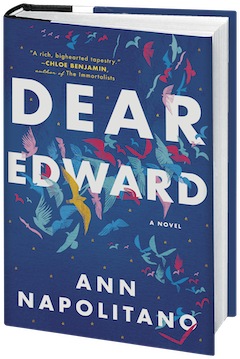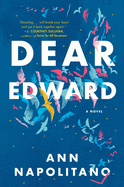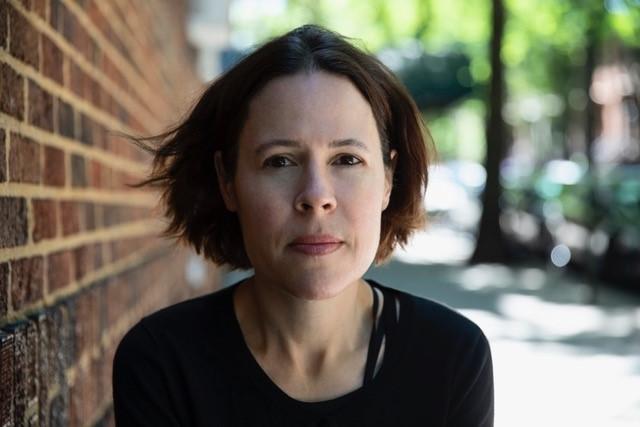Dear Edward
by Ann Napolitano
A plane crashes over northern Colorado; all passengers and crew are believed dead. While searching the crash site, a volunteer paramedic hears a cry: "I'm here!" It's a boy, miraculously alive. But for this boy, being alive brings no joy--he wears his grief like a shroud. In Dear Edward, the story of his deep loss and rocky path to healing, Ann Napolitano (Within Arm's Reach; A Good Hard Look) poignantly explores a child coming of age in the aftermath of tragedy and trauma.
Eddie Adler is 12 years old when he sets off on a flight from Newark for Los Angeles with his parents and 15-year-old brother, Jordan. Through a series of flashbacks, readers learn about the brothers' unbreakable bond. They read each other effortlessly, although Jordan is beginning to differentiate himself: at the airport, he opts out of TSA screening, informing his father that a full-body backscatter is dangerous and ineffective.
Their father, Bruce, a mathematician, homeschools the boys. "Fatherhood is, for him, one jolt of terror after another." He used to carry them like live grenades; he adores them, yet thinks them capable of exploding in myriad ways for which he's not prepared. On the flight, their mother, Jane, a screenwriter, is seated in first class, feeling guilty, but needing the privacy to finish a script before they land.
Napolitano limns the other passengers, as she does the Adlers, with deft strokes. Linda is on the way to meet her boyfriend, Gary, who doesn't know she is pregnant. Benjamin, a black soldier, muscular and "wide as a chest of drawers," is recovering from a bullet wound. He's traumatized by both the injury and a self-revelation. Mark, with two Forbes profiles under his expensive belt, is on his way to California to close a major deal. Known around the office as The Hammer, Mark's entranced by chief flight attendant Veronica, "a Broadway musical made flesh." Veronica loves her job and enjoys gliding down the aisle--"She asks for every look then throws it like a coin into the till." We learn their thoughts, their fears, their expectations. As Napolitano weaves their stories throughout, even though we know their fate, we are still shocked at the loss of these vivid lives.
Early in his hospital stay, while Eddie is unconscious, his aunt and uncle decide that the press should use his given name, a minor attempt at privacy--"Eddie" is family, "Edward" is for strangers. But he stays Edward--a gravitas that seems fitting--and moves in with his anxious and grieving aunt and uncle. He feels smothered under their worried gaze, the watching eyes of the town and the students at school. Food is irrelevant. He can't tolerate anything that sloshes or melts. His life flat and gray, he seeks refuge with Shay, the girl next door; he sleeps on her bedroom floor. Edward finds solace with Shay and her mother. Shay, in turn, becomes his best friend and cohort. Together, they work to make sense of his new life.
One day, Edward and Shay discover a large cache of letters hidden in his uncle's workshop, letters from those who'd lost passengers on the plane, written to Edward after the tragedy. Most of the writers ask something of him: walk the Great Wall of China in honor of my child; tell my sons to keep reading; open a comedy club. Hundreds of requests, secrets, confessions. They break open something in him; while they are unbearable to read, he feels a relief of sorts: "Each letter feels like a page in a book that he won't fully understand until he reaches the end." The attention Edward brings to the letters is changing him, pulling strands together, allowing him to sleep and dream. He and Shay sort them in secret, and decide to reply to the ones they consider "letters on the edges."
Edward is "pulling 191 dead people, like a fallen parachute, in his wake." He imagines others' lives. He sees Gary, who lost Linda, with binoculars, watching blue whales. He thinks of Benjamin every day, and sees him in the weight room, working out. He sees himself and Jordan playing in the woods. He wants to adopt Jordan's "crinkly, excited energy;" he considers his brother's "F**k no" as an option. "F**k no" to the people telling him how to live. As he pulls the fallen, his burden lightens; as he considers the infinite ripple effects of lives and deaths, he sees possibilities.
Edward wrestles with profound questions that his living generates. Why did these people die? Why was he spared? What is a survivor's obligation to the dead? Or is there obligation? Ultimately, how do we connect with both the living and the dead? Edward's father used mathematics to "tie together pieces of the universe"; Ann Napolitano uses words to do the same in Dear Edward--a dazzling, tender novel about sorrow and despair, resilience and great love. --Marilyn Dahl








